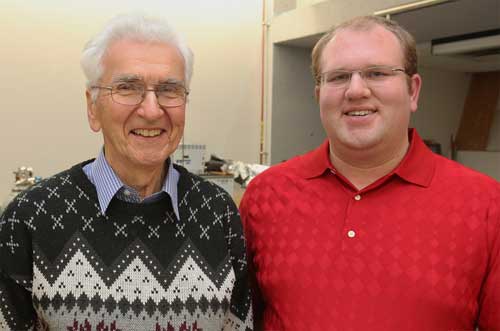Whether the apple struck Sir Isaac Newton on the head or not, history was made. That lone apple tumbling to the ground set off a chain of events that would fundamentally change the way people thought about the physical world.
"Physics is a very recent development in the history of mankind," says Dr. Arvid Schultz, a founding member of the physics department at the University of Lethbridge. "The ancient Greeks were great scholars but Aristotle was a long way from understanding Newton's laws of motion."
Evidencing the discoveries made in the last 400 years, Schultz notes, "It's developed quite rapidly yet the effect has been transformational because physics explains the fundamental laws of our world."
While enjoying the beauty of natural phenomena, such as rainbows or star-filled skies, physicists maintain a childlike curiosity and continue asking: how does that work? The progress made in the 20th century is proof of their commitment to finding answers.

"Things like relativity, quantum mechanics and Nuclear Magnetic Resonance (NMR) have revolutionized modern science and are being practically applied in everyday life," explains Schultz.
The proof can be seen in almost every aspect of our existence. Lasers, for example, were invented in the 1960s and are now used for everything from eye surgery to telecommunications.
"Our instruments are improving and we are gaining great understanding but there are still great mysteries," admits Schultz, whose own research shifted from nuclear physics to astrophysics over the course of his career at the U of L.
Schultz's passion is apparent: although he retired in 1990 and is no longer an active researcher, he maintains a keen interest in the subject matter and visits the department regularly to stay current.
"It's the people that keep me coming back – the faculty and the students," explains Schultz.
It seemed only natural then, that the award developed by the physics department would be named the Arvid Schultz Award.
"The award is named after Dr. Schultz because he cares so much about the subject, the department and the students," explains Dr. Ken Vos, Chair of the physics department. "This award is very characteristic of Arvid."
The award provides a student the opportunity to work with eight different faculty members over the course of a 16-week period, and aims to help familiarize students with the distinct research programs within the department.
"Physics is a love that I have," admits Brent Peterson, a neuroscience student who received the award last May. "I like learning how things work, and that's what this placement was all about."
Since that apple caught Newton's attention, the character of physics research has changed enormously. Nevertheless, this unique award allows students to keep asking "how does that work?", a question Dr. Schultz is still asking himself.
---------
Generously supported by faculty in the Department of Physics and Astronomy, the Arvid Schultz Award allows a student to work in a variety of areas in modern physics. Open to all first- and second-year students with an interest in physics, the award is given out annually and provides $9,000 for a 16-week term starting in May.
The application deadline is Mar. 2, 2012. For more information, please contact Laurie Scott at laurie.scott@uleth.ca.
